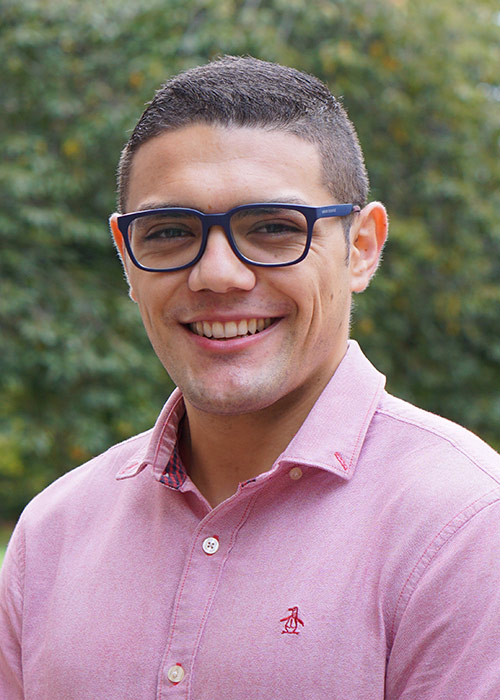
What interested you in studying nutritional sciences?
I come from a country which is currently facing the triple burden of malnutrition — the coexistence of undernutrition, obesity, and micronutrient deficiencies. This nutrition crisis affects the most underserved populations and is common in low- and middle-income countries. Evidence-based interventions and effective public policies are needed to address this situation. I identified that pursuing an MPH in Public Health Nutrition would give me the necessary skills and knowledge I need to make an impact in my community. Through nutritional sciences, I could get involved in the implementation of research and interventions that generate the evidence required to develop policies that will increase access to healthy foods and benefit those who need it the most.
Why did you choose UW?
As a world-renowned university with one of the best Schools of Public Health, University of Washington was always on my radar. I wanted to study an MPH with a concentration in nutritional sciences, and without doubt, UW was one of the best options to achieve this. While searching for different graduate programs, the strong focus on food systems, social determinants of health, and social justice that UW’s program has drew my attention. Also, knowing that I could have the opportunity to interact daily with outstanding faculty and work with them to produce high-quality research convinced me. Now, I know that UW was always the right place for me.
Tell us about your research, internship, or a current focus/project?
I am currently working with Dr. Adam Drewnowski, a professor of epidemiology and director of the Nutritional Sciences Program, and Dr. Alfonso Mendoza-Valazquez, a Fulbright Visiting Scholar, on research studies that aim to identify affordable nutrient-dense foods in Brazil and Mexico. We are using nutrient profiling tools to rank foods based on their nutritional composition, and when combining the data with food prices, we can identify which are the foods with lower cost and higher nutritional value. I have enjoyed this project, as one of my research interests is affordability of healthy diets.
How would you describe the benefits of your research or how it may potentially impact public health?
The prevalence of chronic diseases and malnutrition is increasing in the world. This has been linked to a higher consumption of energy-dense diets, rich in added sugars and fats. To address this situation, various recommendations have focused on the importance of increasing the consumption of nutrient-dense foods, such as vegetables, fruits, and dairy. Yet, recommendations often forget to address food affordability. Healthy diets are unaffordable to almost 3 billion people worldwide, as nutrient-rich diets are more expensive compared to diets with minimal nutritional value. Therefore, the identification of affordable foods that can provide important nutrients to increase diet quality is needed.
The work that I have been able to do with Dr. Drewnowski and Dr. Mendoza-Velazquez is valuable to formulate recommendations that acknowledge both nutrient density and food prices. This can be used to develop policies and interventions that increase access and affordability to healthy foods.
RELATED
Read an article authored by Jonathan published in INNOVARE Science and Technology which outlines the impacts on food insecurity in Honduras as a result of the Russia and Ukraine conflict, and presents alternatives for short-term resolution. INNOVARE Science and Technology is a scientific journal published in Honduras by the Central American Technological University (UNITEC).
What are your future goals?
My immediate goal is to continue doing global nutrition research and keep networking with people from other fields at UW. I am planning to pursue a PhD in the near future to continue strengthening and applying my research competence. My goal is to continue obtaining the skills needed to effectively design and implement nutrition programs and research. I am avidly working to be a pioneer in public health nutrition research and public policy development in low-resource settings.
What extracurricular activities do you enjoy?
Even though it has been challenging to engage in extracurricular activities while pursuing my MPH in Nutritional Sciences at UW, I have been able to continue to be a member of Asociación Despierta Honduras (ADH), an organization working for the sustainable development of Honduras through youth empowerment. I provide technical assistance and workshop trainings in food security and public health in a project called Honduran Changemakers, which aims to train youth from remote areas of the country to help them develop their leadership skills and increase their civic engagement.
What do you like most about living in Seattle?
I love nature, so Seattle is a great place to live in. The city has a lot of beautiful parks where you can go and have a picnic, and amazing hiking trails which are very close to the city. The scenery is just amazing! Even after almost a year of living here, every time I am walking at the campus and Mount Rainier is visible, I just stop, admire it, and take one more picture of it. I have also enjoyed been able to use my bike to commute and the different available tracks where I can go for a run.
What advice would you give a student who is considering graduate study with the UW Nutritional Sciences Program?
My advice is to be proactive and connect with professors, staff, and students outside of the classroom. Networking is crucial and I believe it is one of the most valuable skills to develop in a graduate program. Professors and staff from the Nutritional Sciences Program at UW have been extremely open to have conversations. I have been able to connect with some of them and talk about their research, get valuable advice from them, and get involved in projects they are working on. I will always be grateful to have the opportunity to do this.
Are you interested in studying nutritional sciences as a graduate student? Explore graduate study and RDN training offerings in the UW Nutritional Sciences Program.